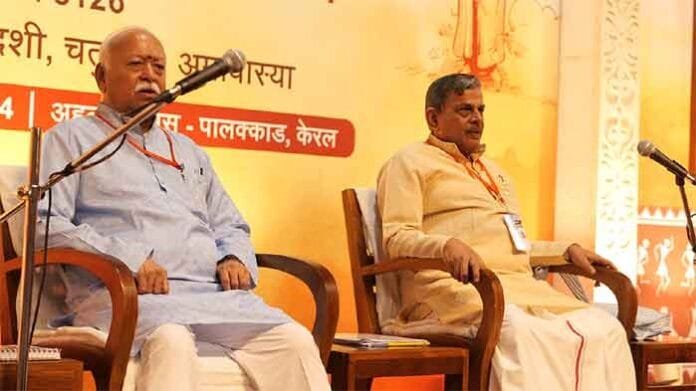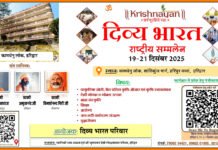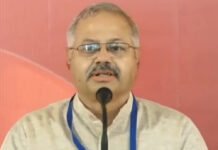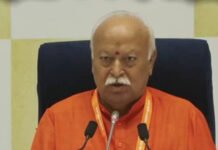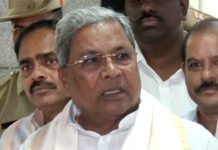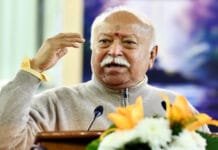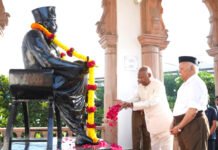Explore why the RSS has come out in support of the caste-based census, focusing on their claims of societal welfare versus political manipulation. Delve into the complexities of this issue and its broader implications for India.
INVC NEWS
Palakkad : In recent discussions, the Rashtriya Swayamsevak Sangh (RSS) has openly supported the idea of a caste-based census, a stance that has sparked considerable debate across India. This move, announced during a three-day coordination meeting in Palakkad, Kerala, is seen as a significant shift in the RSS’s approach to the caste question—a topic that has always been sensitive in Indian society. Sunil Ambekar, the All India Publicity Chief of the Sangh, articulated this position, emphasizing that while the census is crucial for national unity and security, it should not be used as a tool for political gains. Instead, it should strictly serve the purpose of gathering data to benefit the welfare of various communities.
But what does this endorsement mean for the country? Why did the RSS, an organization traditionally seen as a proponent of Hindu unity, come out in favor of such a divisive issue? This article aims to unpack these questions, exploring the nuances of the RSS’s stance on the caste-based census, its potential implications, and the broader context within which this issue sits.
The RSS’s Support for the Caste-Based Census: What’s the Deal?
A Historical Perspective on the Caste Question
Caste has always been a touchy subject in India. It’s an ancient system of social stratification that has dictated the lives of millions of Indians for centuries. The caste system has often been the root of social inequality and discrimination, making it a contentious issue in modern India. The RSS, known for promoting Hindu unity, has historically walked a fine line when addressing caste, acknowledging its existence while advocating for its eradication in favor of a more unified Hindu society.
However, in today’s context, the call for a caste-based census is not just about acknowledging caste but actively measuring it. Why did the RSS come in support of caste-based census at this juncture? It’s a significant departure from a past where discussions on caste within the Sangh Parivar were often hushed, with a preference for promoting a casteless Hindu identity.
RSS’s Reasoning: Welfare Over Politics
During the Palakkad meeting, Ambekar highlighted that the caste census is vital for the welfare of the people, particularly those belonging to the marginalized communities. The RSS’s position is that the census should be a data-gathering exercise purely for the upliftment of these communities, not a political tool to be wielded during elections.
This distinction is crucial. Ambekar’s statement reflects a concern that while caste-based data is necessary for crafting effective welfare policies, it should not be manipulated for electoral gains. He underscored that caste is a “very sensitive issue” in Hindu society, and mishandling it could lead to further divisions.
The Importance of Data in Policy-Making
The RSS’s argument leans heavily on the idea that data is essential for making informed policy decisions. Without a clear understanding of the demographics, particularly in a society as complex as India’s, how can the government effectively address issues of inequality? In this light, the caste-based census becomes a tool for social justice, enabling targeted interventions to uplift historically oppressed groups.
The Fear of Political Manipulation
Yet, there’s an underlying fear that the RSS’s support for the caste-based census could be co-opted by political entities for their benefit. In India, caste is often a key factor in elections, with many political parties banking on caste-based voting blocs to secure victories. The RSS’s caution against using the census as a political tool is a reflection of the broader concern that caste, when politicized, can deepen social divisions rather than heal them.
Broader Implications: National Unity or Fragmentation?
Caste Census and National Unity
The RSS’s emphasis on national unity is not new. For decades, the organization has worked towards the idea of a unified Hindu society, transcending caste divisions. But does supporting a caste-based census align with this goal? The census, by its very nature, categorizes people, potentially reinforcing the very divisions the RSS seeks to dissolve.
However, from the RSS’s perspective, recognizing these divisions is a step towards addressing them. By acknowledging the existence of caste-based disparities, the organization believes that more effective policies can be crafted to bridge these gaps, ultimately fostering a more unified nation.
Potential Risks and Rewards
The potential risks of this approach are clear. A caste-based census could entrench caste identities further, making it harder to move towards a truly casteless society. On the other hand, ignoring caste-based realities could perpetuate existing inequalities, undermining the goal of national unity.
The rewards, however, could be substantial. With accurate data, the government could better target welfare schemes, ensuring that resources reach those who need them most. This, in turn, could lead to a more equitable society, reducing the socioeconomic disparities that have long plagued India.
Related Issues Discussed: UCC, Hindu Concerns in Bangladesh, and Waqf Board Amendments
Uniform Civil Code (UCC): A Step Towards Equality?
Another significant issue discussed during the Palakkad meeting was the Uniform Civil Code (UCC). Ambekar mentioned that the UCC model is already public and cited the example of Uttarakhand, where the government invited public input before implementing it. The idea behind UCC is to create a common set of laws governing personal matters like marriage, divorce, and inheritance, irrespective of religion.
For the RSS, UCC represents another step towards national unity by ensuring that all citizens are subject to the same laws, thereby reducing divisions based on religious identity. However, much like the caste-based census, UCC is a sensitive issue that requires careful handling to avoid alienating minority communities.
The Situation of Hindus in Bangladesh
The RSS also expressed concern over the situation of Hindus and other minorities in Bangladesh. According to reports presented during the meeting, the condition of these communities is worrying, prompting the RSS to urge the Indian government to engage in talks with Bangladesh to ensure their protection.
This issue ties into the broader theme of protecting Hindu interests globally, a consistent focus for the RSS. The organization’s call for diplomatic intervention highlights its role in advocating for Hindus beyond India’s borders, reinforcing its identity as a guardian of Hindu interests.
Waqf Board Amendments: A Complex Debate
Lastly, the RSS addressed the issue of amendments related to the Waqf Board, a topic that has generated significant discussion. The Waqf Board, which manages properties dedicated to religious or charitable causes in the Muslim community, has been the subject of numerous complaints, prompting calls for reform.
The RSS’s involvement in this debate signals its broader interest in ensuring that all religious communities are held to the same standards of accountability. However, it’s a delicate issue that requires a balanced approach to avoid escalating tensions between communities.
FAQ
Why did the RSS come in support of caste-based census?
The RSS supports the caste-based census primarily as a means to gather data that can inform welfare policies. They believe that accurate demographic information is crucial for addressing social inequalities but caution against using the census for political gain.
How does the RSS’s support for the caste census align with its goal of Hindu unity?
While the caste census may seem to contradict the RSS’s goal of Hindu unity, the organization believes that recognizing caste-based disparities is necessary to address them. By gathering data on caste, the RSS hopes to craft more effective policies that can reduce these inequalities and foster a more unified society.
What are the risks of conducting a caste-based census?
The primary risk is that a caste-based census could entrench caste identities further, potentially deepening social divisions. There is also a concern that political parties could manipulate the data for electoral gains, which could undermine the goal of national unity.
What other issues did the RSS discuss during the Palakkad meeting?
In addition to the caste census, the RSS discussed the Uniform Civil Code, the situation of Hindus in Bangladesh, and amendments related to the Waqf Board. These discussions reflect the organization’s broader focus on national unity, religious equality, and the protection of Hindu interests.
Conclusion
The RSS’s support for a caste-based census is a complex and multifaceted issue that reflects the organization’s broader goals of social welfare and national unity. While the census has the potential to address long-standing inequalities, it also carries significant risks, particularly if used as a political tool. The RSS has made it clear that their support for the census is rooted in a desire to gather data that can inform effective policies, not to deepen social divisions. However, the challenge lies in ensuring that this delicate issue is handled with the care it demands, balancing the need for accurate data with the imperative of maintaining national unity.
As India moves forward, the caste-based census will undoubtedly remain a topic of intense debate, with its implications reverberating across the social, political, and cultural landscape. Whether it serves as a tool for empowerment or a source of division will depend largely on how it is implemented and utilized in the years to come.

